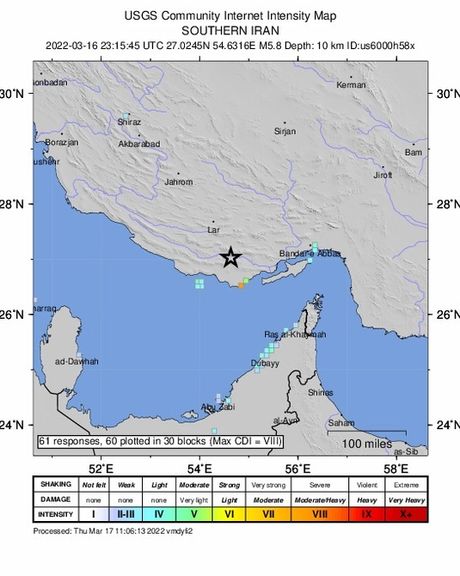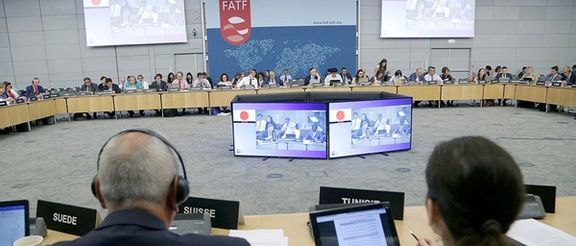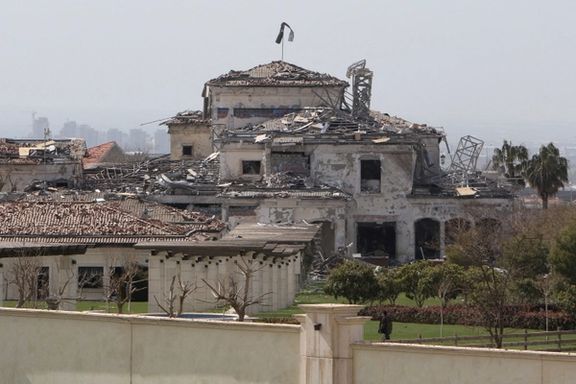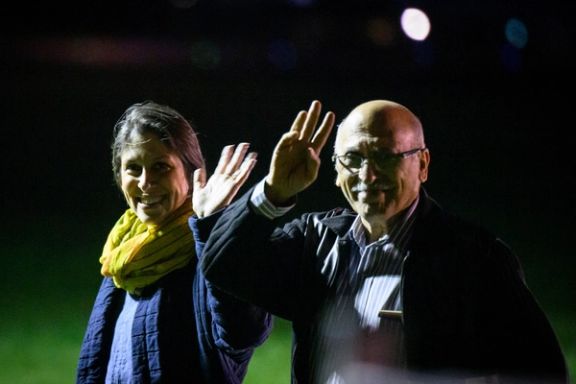Magnitude 6.0 Earthquake Hits Southern Iran

An earthquake measuring 6.0 magnitude has hit the southern Iranian province of Hormozgan and was felt in the United Arab Emirates.

An earthquake measuring 6.0 magnitude has hit the southern Iranian province of Hormozgan and was felt in the United Arab Emirates.
According to the GFZ German Research Center for Geosciences, the quake took place early on Thursday around 2:45 a.m. local time at a depth of 10 kilometers (6.21 miles).
The United States Geological Survey (USGS) said it was a Magnitude 5.8 earthquake and its epicenter was 16 kilometers to Kookherd district and 57 kilometers to Bandar-e Lengeh harbor city.
According to locals, water, electricity and telephone line were out for a few hours in the quake-hit areas.
No casualties or significant damage have been reported so far, but Interior Minister Ahmad Vahidi said that expert teams have been dispatched to the area to assess the damage.
Twitter users in Dubai reported being woken up as their apartment buildings shook from the quake.
Iran is crisscrossed by major geological fault lines and is one of the most earthquake-prone countries in the world because it is located where the Arabian, Indian, and Eurasian tectonic plates meet.
Iran has had a terrible history of massive earthquakes in recent decades, with some killing up to tens of thousands of people and causing billions in damages, such as the magnitude 6.6 quake in Kerman province in 2003 that killed 31,000 people and flattened the ancient city of Bam.

Experts say Iran's international trade will continue to suffer without accession to the money-laundering watchdog (FATF) rules, even if US sanctions are lifted.
Unlike his predecessor Hassan Rouhani, President Ebrahim Raisi and his hardliner supporters do not favor accession to the Paris-based Financial Action Task Force (FATF). Raisi in September criticized the previous administration for insisting on joining the FATF conventions and suggested that his government might prefer to focus on relations with "neighbors and friendly countries," including presumably China and Russia.
Critics of FATF have until now argued that accession would make Iran vulnerable to US sanctions and would curb its ability to support proxy forces, such as Hezbollah in Lebanon, which has also faced US sanctions.
Iran has been on the FATF blacklist, along with North Korea, since February 2020 for failing to pass legislation introducing transparency measures designed to combat money-laundering, corruption, and financing of ‘terrorism.’ FATF members – who host most of the world’s financial centers – are required to undertake enhanced diligence and countermeasures against blacklisted states.
Hardliner supporters of Supreme Leader Ali Khamenei have blocked bills approved by parliament since 2018 to be ratified by a constitutional watchdog.
Experts say with an agreement with world powers in sight to restore the 2015 nuclear deal, Joint Comprehensive Plan of Action (JCPOA), and the lifting of US sanctions, the thorny issue of accession to the FATF must be resolved urgently.
In a commentary entitled "FATF's Future After JCPOA Revival" in Tejarat (Commerce) newspaper on March 15, Mohammad Lahouti, head of Iran Export Confederation, argued that without FATF accession, other countries might hesitate to establish trade with Iran, even if US sanctions end with the signing of a nuclear deal. "The issue of FATF has to be resolved if there is a [nuclear] agreement," he wrote.
Financial and banking expert BahaoddinHashemi says even second and third-rate foreign banks will not deal with black-listed Iranian banks even if Iran improves its relations with world powers after the restoration of the JCPOA, to avoid coming under suspicion of money laundering.
"[Being on the blacklist] of the FATF is one of the most important hurdles in the way of economic relations and attracting [foreign] investment," Hashemi wrote on March 15 in Samt– a newspaper that focuses on issues related to industries, mining, and trade.
Hardliners supporting Supreme Leader Ali Khamenei and the Revolutionary Guard say Iran should “Look East” and build closer ties with China and Russia as a counterweight against the United States and conduct trade with those countries, avoiding dollar transactions as much as possible.
But failure to resolve the FATF issue would be detrimental to international economic relations even with China and Russia, experts say. FATF is a multilateral organization and whether a country trades in US dollars or not, its financial transparency rules still apply.
The FATF blacklist carries with it no formal sanctions, but financial institutions shift their resources and services away from blacklisted countries not to risk legal complications.
Former President Hassan Rouhani and his ministers often complained that hardline rivals opposed FATF accession to increase the difficulties his government faced in managing the economy. Iran would be in a better place if an agreement on the nuclear issue and accession to the FATF happened, he said last July at the general assembly of the Central Bank of Iran. Officials in the Rouhani administration and some reformists also accused hardliners of having a vested interest in practices used to circumvent sanctions.

A clear media divide has emerged in Iran over the war in Ukraine, with some hardliner media repeating Moscow’s propaganda and others trying to reflect reality.
Media affiliated with hardliner factions, including the Revolutionary Guard consistently backed the official government line in the early days of the war, saying the United States and NATO were responsibly by provoking Russia. But the government has not repeated those accusation in recent days.
Mehr news website, however, is notable in parroting pure Russian propaganda. A headline on Thursday said, “Ukrainian Forces Blew Up Mariupol Theater”.
Ukrainian officials and Western correspondents on the ground have reported that a theater in the city where hundreds were seeking refuge from Russian bombardment was targeted and although it was reported on Thursday that many survived, there is no count of how many might have died.
Russia, denying it had carried out a missile or air strike against the building, said Ukrainians blew it up to blame Moscow. Mehr carried the Russian report. The news website is run by the Islamic Propaganda Organization, a state entity financed by the presidential administration but controlled by Supreme Leader Ali Khamenei’s office.
Two news websites controlled by the Revolutionary Guard (IRGC) keep a lower profile in reporting on Ukraine.
Fars news agency had only one headline about the conflict, hidden well below other items on its website on Thursday., although it had more reporting in the early days of the invasion with an obvious pro-Russia bias. But it also tries to present Russian statements as truth, while presenting Western positions with a shroud of doubt.
The other IRGC flagship news website, Tasnim, maintains a live blog on the conflict with somewhat of a balanced reporting, although avoiding news about Russian attacks on civilians. It covers most diplomatic developments and reflects reports about support for Ukraine.
Kayhan, an ultra-conservative newspaper controlled by Khamenei’s office, strongly backed Russia's invasion of Ukraine in the early days with extensive reports and commentaries. But it has been relatively silent in the past week, perhaps sensing that Russia is stuck in an unwinnable conflict.
Tabnak website, affiliated with one of President Ebrahim Raisi’s deputies, former iRGC commander Mohsen Rezaee, has become much more balanced in its coverage in recent days.
While the hardliner media try to muddle through amid popular support for Ukraine on social media, outlets run by reform minded loyalists approach the conflict in a much more even-handed manner.
Headlines such as “Russia Bombed a Mosque – 79 Children Died” in Aftab News this week, can be observed in some newspapers and websites.
An interesting case is Fararu website, one of the relatively more independent sources given Iran's media restrictions. Fararu, publishes translations of Western press op-eds and analysis on Ukraine, as a clever way to reflect diversity of views and information.
The media divide is also visible on attitudes toward Russia as they relate to Iran and its nuclear negotiations with the West.
After Russia demanded exemption from Ukraine sanctions in its relations with Iran, media with a reformist tilt called Moscow an “obstructionist” who has taken Iran’s nuclear talks with the West hostage. Hardliner media stayed away from criticizing Russia, reflecting government statements seen by many as supportive of Moscow.
Whether the centers of power in the Islamic Republic tolerate the anti-Russian tone of some newspapers and websites, or simply are too busy these days amid nuclear talks and launching ballistic missiles at Iraq, is hard to say.

The United States’ mission to the United Nations has urged a Security Council session over Iran’s ballistic missile attack at Iraq’s Erbil.
In a tweet on Wednesday, the US mission called for a UN Security Council discussion “to condemn Iran’s missile attack on the Kurdistan Region of Iraq”.
Describing it as “reckless and unprovoked”, the mission said, “the attack struck a civilian residence in Erbil and was an outrageous violation of Iraq’s sovereignty and territorial integrity”.
“Security Council members should condemn this attack, hold Iran accountable, and support Iraq’s democracy and sovereignty”, it added.
Iran's Revolutionary Guards (IRGC) took responsibility for targeting the capital of Iraq's autonomous Kurdistan with over a dozen ballistic missiles allegedly to destroy an Israeli intelligence base, while reports say the Biden Administration is considering removing IRGC from its foreign terrorist blacklist.
Sunday’s missiles fell close to a United States consulate building, damaging a villa that Iran claimed was used by Israelis.
Earlier on Monday, the Supreme Judicial Council of the Iraqi Kurdistan Region called on Baghdad to refer the case of Iran's attack to the UN Security Council, saying the government must take all necessary measures against the violation of Iraq’s sovereignty.
The council also urged the Iraqi parliament and international institutions to take "decisive and serious" action to stop Iran's strikes.
The Iranian parliament has issued a statement praising the Revolutionary Guard for its attack.

A Telegram channel apparently linked to the Islamic Republic has leaked photos and personal documents about Mossad director David Barnea and his family.
The channel, called "Open Hands", released a video on Tuesday showing the documents and photos and claimed it obtained the material with an extensive surveillance campaign ongoing since 2014.
The channel was created hours before the leak and published multiple versions of the video with subtitles in Arabic and Hebrew as well as English, but the same video was republished with Persian subtitles and a logo of Iranian website NourNews, which is affiliated with the secretary of Iran's Supreme National Security Council (SNSC), Ali Shamkhani.
The group also posted the video on other platforms such as Youtube and Twitter with these captions: “We've got a small gift for the Mossad; With LOVE for David. Happy Purim. To Be Continued”. In their Youtube channel, the video is titled “covert intelligence gathering operation from director of Mossad”.
Files shown in the video include personal photos of Barnea with his family, plane tickets purchased by him, tax documents, and a satellite image of what is claimed to be his house.
The Israeli prime minister’s office issued a statement, saying the “material shown is old and did not originate from the Mossad director’s personal phone.”
Iran claimed it targeted a secret Israeli intelligence base in Iraq’s Erbil with ballistic missiles on March 13, presumably in retaliation for an Israeli aerial attack that destroyed hundreds of drones at an IRGC airbase.

Two British Iranian dual nationals freed from Iran arrived in Britain on Thursday, ending an ordeal during which they became a bargaining chip in Iran's nuclear talks with the West.
British-Iranian aid worker Nazanin Zaghari-Ratcliffe and Anoosheh Ashoori arrived at the British military airbase of Brize Norton in Oxfordshire, shortly after 1 a.m. local time. They walked off the plane together and smiled and waved as they entered an airport building.
"It has been a really difficult 48 hours," British Foreign Secretary Liz Truss said shortly after Zaghari-Ratcliffe and Ashoori arrived at the base. "The expectation was that they would be released but we weren't sure right until the last minute so it's been very emotional but also a really happy moment for the families."
Zaghari-Ratcliffe's husband Richard said the long ordeal appeared to finally be over. "It's just a relief, the idea that we can go back to being a normal family, that we don't have to keep fighting, that this long journey is almost over," he told Reuters.
A statement from Ashoori's family thanked everyone who had worked towards his release. "1,672 days ago our family's foundations were rocked when our father and husband was unjustly detained and taken away from us.
Antonio Zappulla, CEO of Zaghari-Ratcliffe's employer, the Thomson Reuters Foundation, said her release was "a ray of light and hope" at a time when the world was in turmoil. The foundation is a charity that operates independently of Thomson Reuters and its news subsidiary Reuters.